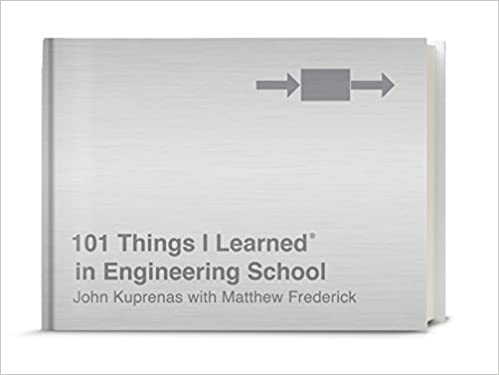101 Things I Learned In Engineering School
This books presents the fundamental ideas from physics and engineering in an accessible way. I found that a lot of its lessons apply equally to life, business, relationships, and many other fields.

A battery works because of corrosion.
Friction is the enemy of a rolling object, but it is what allows it to roll.
There’s always a trade-off.
it is impossible to maximize the response to every design consideration. Good design is not the maximization of every response, or even compromise among them; it’s optimization among alternatives.
Structures are built from the bottom up, but designed from the top down.
Make sure it doesn’t work the wrong way.
Figuring out how to make a system work is as important as figuring out how to make it not work in undesirable ways.
A masonry arch gets stronger as it does more work. The greater the loads on an arch, the more the masonry units cohere, until the compressive strength of the material is exceeded. For this reason, a masonry arch will tend to destabilize when there is a relatively small load on it, or may simply look unstable if there is relatively little masonry above it.
In practice, however, faster work produces more confusion, errors, substandard quality, and overtime pay, driving up costs. An extremely long work period also increases total costs, particularly indirect costs. Optimal project duration minimizes the combination of indirect and direct costs.
Few customers will pay for a perfectly engineered product. Customers notice and are willing to pay for improvements to low-quality products more than high-quality products. A 10% improvement to a low-quality product will lend more than a 10% increase in the value of quality—the user’s perception of its quality.
Articulate the why, not just the what. When passing a concept to other designers to develop, make known the reasons for the decisions made to that point, whether technical, ergonomic, personal, or other. By articulating your intent, you will help them understand and preserve the most critical goals of the project while giving them room to investigate possibilities that did not occur to you.
When struggling to analyze a complex problem, shift your point of view from that of outside observer to that of the thing you are analyzing. If you were that thing, what forces would you feel? What internal stresses would you experience? How would you have to react in order to remain stable and not twist, turn, deform, be pushed over, or be caused to accelerate?
Don’t get distracted by all the other possibilities such that you forget to do the one thing you must do. But don’t become so focused on the one thing that you don’t do as much as you can.